How to Maintain Your Sexual Health in a Sapphic Relationship

Let's face it: Sex education is pretty heteronormative. It’s common for instructors to center information concerning straight, cisgender couples, excluding the needs of people who don't identify this way: Fewer than 5 percent of LGBTQ+ students had health classes that included positive representation of queer topics, according to a 2013 Gay, Lesbian & Straight Education Network survey. As a result, many of them get their sex education online or from unreliable peers, putting LGBTQ+ youth at risk for more dangerous sex.
Sapphic relationships—that is, sexual and romantic relationships between women—are often assumed to be safer than other kinds, but this can lead to misconceptions that queer women aren’t at risk of STIs and a lack of discussion about sapphic sexual health products, such as dental dams and female condoms.
It’s vitally important for queer women to take care of their sexual health, so here's a handy guide to staying safe in these relationships.
Testing 1...2...3...
While women can’t impregnate each other, they can spread STIs. "Contact with bodily fluids via toys or oral sex can still pose a risk," said Tara Scott, MD, chief medical officer of Revitalize Medical Group in Akron, Ohio. "Bacterial vaginosis may not be contagious but can arise from the disruption of bacterial balance and pH in the vagina. Herpes-type 2 can also be spread from oral sex.” The human papillomavirus (HPV), which can cause cervical cancer, can be transmitted orally, through genital contact and by sharing sex toys.
To protect yourself from STIs, Scott emphasized the importance of getting tested regularly and knowing your status and your partner’s, which means having some honest conversations. "There is nothing wrong with asking about the last STI exam," said Angela Jones, a New Jersey-based OB-GYN.
Staying protected
Some safe-sex products are a sapphic woman’s best friend, such as dental dams and female condoms. Dental dams are latex or polyurethane sheets used between the mouth and vagina or anus during oral sex; female condoms are basically regular condoms that go inside a vagina instead of over a penis. To use a female condom, push the thick ring with the closed end up inside your vagina until it reaches your cervix.
You’ll also want to clean your sex toys, regardless of whether they "look okay." This is especially important if you’re sharing them or using them for multiple kinds of sexy fun. "You’ll want to wash sex toys in between uses if you’re going from one orifice to another, and another and another," Jones said.
Usually, all you’ll need to wash your sex toys is soap and water, but the cleaning process can differ depending on the toy's material. Toys made of rubber, latex and jelly will need a little extra scrubbing.
Getting in the stirrups
Sapphic women, especially lesbians, may not often visit their gynecologist because they have less need for contraceptives, according to a 2014 study in the Journal of Lower Genital Tract Disease. But regular gynecology check-ups are crucial for all women to maintain their sexual health. "And any time there is a new partner, testing for sexually transmitted infections is needed," Scott said. "Monthly breast exams are also important."
How often you get tested for STIs depends on your situation, Jones explained: If you’re in a mutually monogamous relationship, you’re probably fine with an annual exam, but if you’re hitting up your Tinder matches for hookups—no judgment!—you may want to get tested more frequently. Jones said some people follow "the rule of thumb,” which is getting tested with each new partner: “That way you both can be confident you’re entering into the relationship with a ‘clean slate,’ so to speak.”
'Doctor, I’m gay'
It’s important to be clear with your doctor about your sexual orientation and whom you’re sleeping with. Doctors sometimes assume sapphic women never sleep with men, and as a result, they may not give you a cervical cancer screening. But all women need to be screened for breast cancer and cervical cancer, Jones said, regardless of their sexual preferences or practices.
Doctors generally mean well but may not be up to date with the latest LGBTQ+ lingo or practices, so be mindful of communication breakdowns. “I think a lot of doctors don't know the term ‘sapphic,'’' Scott said. “And a lot don't ask specifically [about your] sexual preference.”
If you’re worried about experiencing homophobia at the doctor’s office, that’s understandable and, unfortunately, sometimes warranted. To find a queer-friendly doctor, consult the GLMA provider directory.
Sapphic women are as entitled as anyone else to sexual enjoyment, comprehensive health care and sexual health, so remember to get tested, use protection, make appointments with your gyno and keep doctors up to date on any new sexual partners—with pride, of course.


















